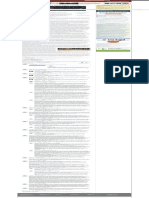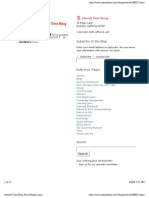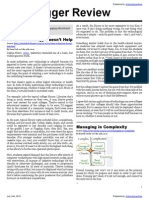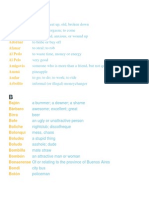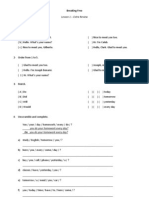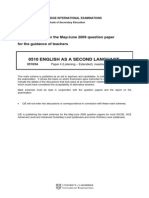When Pedagogical Fads Trump Priorities
When Pedagogical Fads Trump Priorities
Uploaded by
Erick TristãoCopyright:
Available Formats
When Pedagogical Fads Trump Priorities
When Pedagogical Fads Trump Priorities
Uploaded by
Erick TristãoCopyright
Available Formats
Share this document
Did you find this document useful?
Is this content inappropriate?
Copyright:
Available Formats
When Pedagogical Fads Trump Priorities
When Pedagogical Fads Trump Priorities
Uploaded by
Erick TristãoCopyright:
Available Formats
2017618 When Pedagogic Fads Trump Priorities Education Week
EDUCATION WEEK TEACHER DIGITAL DIRECTIONS MARKET BRIEF TOPSCHOOLJOBS SHOP ADVERTISE
June 18, 2017
LOGIN | REGISTER | SUBSCRIBE
Browse archived issues Current Issue TOPICS BLOGS REPORTS & DATA EVENTS OPINION VIDEO GALLERY JOBS
Published Online: September 27, 2010
Published in Print: September 29, 2010, as When Pedagogic Fads Trump Priorities
поменять
прокси
COMMENTARY Get more stories and free enewsletters!
When Pedagogic Fads Trump Priorities Email
By Mike Schmoker Password
Several years ago, I had a courteous, if troubling, email
PrinterFriendly
Select your primary connection to education
exchange with the architect of a hugely popular instructional
Email Article
Send me Edweek Update enewsletter (Daily)
innovation. She had heard that I had been criticizing this
Reprints
approach. (I had.) In a series of emails, I explained my REGISTER NOW
Comments
reasons, starting with the fact that there was no research or By clicking "Register" you are agreeing to the Terms of
Tweet
Service and Privacy Policy.
strong evidence to support its widespread adoption. I asked, with
Share 0
increasing importunity, for any such evidence. Only after multiple
requests did I finally receive an answer: There was no solid Data retrieving error
research or school evidence.
MOST POPULAR STORIES
The innovationDifferentiated Instructionwent on to become one of the most widely
Viewed
adopted instructional orthodoxies of our time. It claims that students learn best when
Data retrieving error
(despite some semantically creative denial) grouped by ability, as well as by their
Emailed
personal interests and "learning styles."
Data retrieving error
I had seen this innovation in action. In every case, it seemed to complicate teachers'
Commented
work, requiring them to procure and assemble multiple sets of materials. I saw
frustrated teachers trying to provide materials that matched each student's or group's Data retrieving error
presumed ability level, interest, preferred "modality" and learning style. The attempt
often devolved into a frantically assembled collection of worksheets, coloring exercises, SPONSORED WHITEPAPERS
and specious "kinesthetic" activities. And it dumbed down instruction: In English, • Assess and Support the Whole Child
"creative" students made things or drew pictures; "analytical" students got to read and • What Is the Right Time to Benchmark and
Monitor Progress?
write.
• How to Keep Up With School Tech Challenges
in the Digital Age
In these ways, Differentiated Instruction, or DI, corrupted both curriculum and effective
• 6 Ways to Cultivate Growth Mindset
instruction. With so many groups to teach, instructors found it almost impossible to
• Leveraging Digital Content to Differentiate
provide sustained, properly executed lessons for every child or groupand in a single Learning
class period. It profoundly impeded the teacher's ability to incorporate those protean, • How to Develop a Successful Personalized or
Blended Learning Program
decadesold elements of a good lesson which have a titanic impact on learning, even in
• How to Make Your Case for EarlyChildhood
mixedability classrooms (more on this in a moment). Education
When I shared these reasons with
educators, many were glad to hear their
suspicions affirmed. They had often been Special Services Director / School Psychologist
SJISD, Friday Harbor, WA
required to integrate DI into all their lessonsagainst their best instinctsas the program
Chief Financial Officer
morphed, without any reliable evidence of its effectiveness, into established orthodoxy. Dallas ISD, Dallas, TX
Others, however, were angered by any criticism of DI. Their reactions stopped some of Mandarin Dual Language Immersion
Kindergarten Teacher
my presentations dead in their tracks. These educators, and their districts, had invested Batesville Community School Corporation, Batesville, IN
enormous amounts of time, treasure, and hope in this pedagogical approach. Athletic Director
Newburgh Enlarged City School District, Newburgh, NY
We now have evidence that the investment in DI, despite the hype and priority it Director of Special Education and Student
received, was never fully warranted. It is on no list, short or long, of the most effective Services, PK12
Fairfield Public Schools, Fairfield, CT
SciHub
educational actions or interventions. Several recent reviews of research by prominent
http://www.edweek.org/ew/articles/2010/09/29/05schmoker.h30.html MORE EDUCATION JOBS >> POST A JOB >>
Открыто через прокси 2 из 6
▶
scholars in the field demonstrate that the concept has been running largely on
URL статьи или журнала, или DOI, или строка для поиска
http://www.edweek.org.scihub.io/ew/articles/2010/09/29/05schmoker.h30.html Помочь проекту 1/3
2017618 When Pedagogic Fads Trump Priorities Education Week
enthusiasm and a certain superficial logic. As Bryan Goodwin of Midcontinent
Research for Education and Learning, or MCREL, has written, there is "no empirical
research" whatsoever for schools to adopt DI if they wish to avail themselves of the
best ways to promote learning or close achievement gaps. Literally hundreds of studies
confirm this. In fact, the very notion that DI put so much stock inthat every student has
a distinct learning style or "modality" and must be taught accordinglyhas been roundly
debunked by New Zealand's John Hattie and the University of Virginia's Daniel T.
Willingham, both education researchers of the first rank.
Of course, Differentiated Instruction is only one among many prominent detours поменять
прокси
American education has taken, none more pernicious than the choplogic and excesses
of what is now being advocated in the name of "21stcentury education" or the simplistic
requirement for teachers to mindlessly "incorporate technology" into their lessonsas
though that will rescue poor instructional plans from failure.
What, then, should be our priorities? I would contend that we already know them. They
are essential to an education for the 21st century, but are in fact old friends. Three
simple things matter more than all else if we want better schools.
First, we need coherent, contentrich guaranteed curriculumthat is, a curriculum which
ensures that the actual intellectual skills and subject matter of a course don't depend on
which teacher a student happens to get. Such a curriculum need not be perfect, and it
should make some allowances for individual teachers' preferences. In a majority of
schools, we do not yet have such curricula, even though this may have more impact on
learning than any other factor.
Secondand just as importantwe need to ensure that students read, write, and discuss,
in the analytic and argumentative modes, for hundreds of hours per school year, across
the curriculum. We aren't even close to that now. All students should be reading deeply,
discussing, arguing, and writing about what they read every day in multiple courses. We
can do this: Consider that students spend about 1,000 hours per year in school.
Third, we need to honor, beyond lip service, the nearly halfcenturyold model for good
lessons that all of us know, but so few consistently implement (except, notably, when
being formally evaluated).
Good lessons start with a clear, curriculumbased objective and The consistent
delivery of lessons
assessment, followed by multiple cycles of instruction, guided
that include multiple
practice, checks for understanding (the soul of a good lesson), checks for
and ongoing adjustments to instruction. Thanks to the British understanding may
be the most
educator Dylan Wiliam and others, we now know that the
powerful, cost
consistent delivery of lessons that include multiple checks for effective action we
understanding may be the most powerful, costeffective action can take to ensure
learning.
we can take to ensure learning. Solid research demonstrates
that students learn as much as four times as quickly from such lessons.
Nothing rivals these three considerations. Mountains of evidence proclaim their
centrality. They should, therefore, be education's nearexclusive focus, our highest
priority for at least a period of yearsor until they are satisfactorily and routinely
implemented. Then we can innovatejudiciouslystarting with pilots and sensible
monitoring before we expand promiscuously on the basis of superficial appeal.
For decades, we have put novelty and the false god of innovation above our most
obvious, proven priorities. If we gave these priorities the chance they deserve, we
would achieve perhaps the most swift and dramatic progress toward improvement in our
history. We could make breathtaking strides toward ensuring a high quality of education
for all.
SciHub http://www.edweek.org/ew/articles/2010/09/29/05schmoker.h30.html
URL статьи или журнала, или DOI, или строка для поиска
▶ Открыто через прокси 2 из 6
http://www.edweek.org.scihub.io/ew/articles/2010/09/29/05schmoker.h30.html Помочь проекту 2/3
2017618 When Pedagogic Fads Trump Priorities Education Week
Mike Schmoker is an author, speaker, and consultant in education. His most recent book
is Results NOW: How We Can Achieve Unprecedented Improvements in Teaching and
Learning (ASCD, 2006). He can be reached at schmoker@futureone.com.
Vol. 30, Issue 05, Pages 2223
RELATED STORIES
“Chat: Exploring Differentiated Instruction,” May 15, 2009.
"Differentiated Learning," (On Special Education Blog) February 25, 2008.
поменять
прокси
Commenting temporarily disabled due to scheduled maintenance. Check back soon.
Ground Rules for Posting
We encourage lively debate, but please be respectful of others. Profanity and personal attacks are
prohibited. By commenting, you are agreeing to abide by our user agreement.
All comments are public.
Back to Top
ACCOUNT MANAGEMENT CONTACT US POLICIES ADVERTISE WITH US EPE INFO EDUCATION WEEK PUBLICATIONS
• Register or Subscribe • Help/FAQ • User Agreement • Display Advertising • About Us • Education Week
• Online Account • Customer Service • Privacy • Recruitment • Staff • Teacher
Advertising
• Print Subscription • Editor Feedback • Reprints • Work@EPE • Digital Directions
• Manage ENewsletters/ • Letters • Mission and History • Market Brief
Preferences to the Editor
• TopSchoolJobs
• Group Subscription
© 2017 Editorial Projects in Education
6935 Arlington Road, Bethesda MD 20814 18003461834 (Main Office) 18004458250 (Customer Service)
SciHub http://www.edweek.org/ew/articles/2010/09/29/05schmoker.h30.html
URL статьи или журнала, или DOI, или строка для поиска
▶ Открыто через прокси 2 из 6
http://www.edweek.org.scihub.io/ew/articles/2010/09/29/05schmoker.h30.html Помочь проекту 3/3
You might also like
- Discovering Orff PDFDocument4 pagesDiscovering Orff PDFchua07260% (1)
- Avoiding PlagiarismDocument9 pagesAvoiding PlagiarismRyan ManubagNo ratings yet
- Parables Lesson PlanDocument3 pagesParables Lesson PlanpghsNo ratings yet
- Writing An Opinion Essay B2+Document33 pagesWriting An Opinion Essay B2+Lety BurgueñoNo ratings yet
- Reducing Student-Behavior Problems - Notes From A High School Teacher - Education Week Teacher PDFDocument4 pagesReducing Student-Behavior Problems - Notes From A High School Teacher - Education Week Teacher PDFnajihahNo ratings yet
- What Is The Nature of Evidence That Makes A Difference To LearninDocument12 pagesWhat Is The Nature of Evidence That Makes A Difference To LearninBen RobertsNo ratings yet
- Edublogger Review: Lessons From The WoodsDocument5 pagesEdublogger Review: Lessons From The WoodsphilosophyandrewNo ratings yet
- Edublogger Review: Define "In The Discipline"Document6 pagesEdublogger Review: Define "In The Discipline"philosophyandrewNo ratings yet
- Six Characteristics of A Great STEM Lesson - Education Week TeacherDocument1 pageSix Characteristics of A Great STEM Lesson - Education Week Teachercristianastudillo1No ratings yet
- How People Learn 2003Document12 pagesHow People Learn 2003Jay Cross100% (1)
- Cobb 1999Document41 pagesCobb 1999Haile YidegNo ratings yet
- Session3 Lecture5 ImmersionInteractionDocument21 pagesSession3 Lecture5 ImmersionInteractionMahreen MalikNo ratings yet
- Online Methods For 6 Types of Learning - Educational EnhancementDocument5 pagesOnline Methods For 6 Types of Learning - Educational EnhancementLinh NguyenNo ratings yet
- Agile Learning Newspaper: Unplugged!Document12 pagesAgile Learning Newspaper: Unplugged!davidjenningsNo ratings yet
- 2006 Siemens ConectivismoDocument43 pages2006 Siemens ConectivismoAngelos Giannoulas100% (1)
- EdPuzzle Archives - Innovative Education in VTDocument4 pagesEdPuzzle Archives - Innovative Education in VTJedahlyn Rose Balad-onNo ratings yet
- Effective TeachingDocument34 pagesEffective TeachinghanyemilNo ratings yet
- Student Copy Module 1Document45 pagesStudent Copy Module 1Kristen BruceNo ratings yet
- Ed 60 M2 NotesDocument19 pagesEd 60 M2 Notessil3ntp3arlNo ratings yet
- Literacy Strategies - American Geosciences Institute PDFDocument6 pagesLiteracy Strategies - American Geosciences Institute PDFMateus Filipe Pereira PrimoNo ratings yet
- Anti-Teaching: Confronting The Crisis of SignificanceDocument4 pagesAnti-Teaching: Confronting The Crisis of Significancemwesch100% (5)
- 9 Design Concepts For Creating Collaborative Student Spaces On Campus - Page 2 of 2 - ECampus NewsDocument3 pages9 Design Concepts For Creating Collaborative Student Spaces On Campus - Page 2 of 2 - ECampus NewsPriyam KumarNo ratings yet
- Cambourne ConditionsLiteracyLearning 2000Document5 pagesCambourne ConditionsLiteracyLearning 2000JustinBlakeNo ratings yet
- Student Learning Guide: St. Rita's College of BalingasagDocument2 pagesStudent Learning Guide: St. Rita's College of BalingasagPhoebe Jel AgocoyNo ratings yet
- What Are Some Ways To Make Studying More Interesting?: 4 AnswersDocument1 pageWhat Are Some Ways To Make Studying More Interesting?: 4 AnswersAskatasunNo ratings yet
- Edublogger Review: I Heart This StoryDocument5 pagesEdublogger Review: I Heart This StoryphilosophyandrewNo ratings yet
- DwwerffdDocument5 pagesDwwerffdreilyshawnNo ratings yet
- Bullying Student VersionDocument28 pagesBullying Student VersionFiker DerejeNo ratings yet
- 2021WeekOneLP.healthDocument3 pages2021WeekOneLP.healthaddisonstahlNo ratings yet
- Fishful Thinking: Cultivate Gratitud in YouthDocument4 pagesFishful Thinking: Cultivate Gratitud in YouthLaura CelisNo ratings yet
- Theories of Motivation-2Document5 pagesTheories of Motivation-2Erick John SaymanNo ratings yet
- Edublogger Review: When Technology Doesn't HelpDocument9 pagesEdublogger Review: When Technology Doesn't HelpphilosophyandrewNo ratings yet
- Reeves SociallyResponsibleEducational 2000Document11 pagesReeves SociallyResponsibleEducational 2000muhsinalqadir79No ratings yet
- Go To PageDocument16 pagesGo To Pageapi-736403372No ratings yet
- QQC - Technology in Education Stefania ListaDocument5 pagesQQC - Technology in Education Stefania Listaapi-366539539No ratings yet
- Seven Types of Bias Teachers Are Vulnerable ToDocument2 pagesSeven Types of Bias Teachers Are Vulnerable ToJuanNo ratings yet
- New Unit DevelopmentDocument1 pageNew Unit Developmentapi-470962934No ratings yet
- Upload Documents For Free AccessDocument1 pageUpload Documents For Free Accessdepalacjessamae8No ratings yet
- TOK AssessmentDocument5 pagesTOK AssessmentWold100% (1)
- Does PPTEnhance LearningDocument5 pagesDoes PPTEnhance LearningcarolNo ratings yet
- Edublogger Review: Full-Timers With OverloadsDocument7 pagesEdublogger Review: Full-Timers With OverloadsphilosophyandrewNo ratings yet
- Teaching Literature Is Teaching in Theory PDFDocument8 pagesTeaching Literature Is Teaching in Theory PDFChaya SurajbaliNo ratings yet
- 숤 Answered step-by-step: Answer & Explanation Related Questions Related CoursesDocument3 pages숤 Answered step-by-step: Answer & Explanation Related Questions Related CoursesJdkrkejNo ratings yet
- Lesson 1.6 Constructivist TeachingDocument8 pagesLesson 1.6 Constructivist TeachingJeannie Rose PoNo ratings yet
- Study-More-EffectivelyDocument6 pagesStudy-More-Effectivelyak6sNo ratings yet
- OPTIMIZING VIDEO FOR LEARNING SSRN-id2909769Document52 pagesOPTIMIZING VIDEO FOR LEARNING SSRN-id2909769JURAMA33No ratings yet
- PBLWorks - Thinking Routines and Project PATH - 0Document1 pagePBLWorks - Thinking Routines and Project PATH - 0Pato LucasNo ratings yet
- Joe Tong - 5 Lessons Learned About Teaching Home Economics While NOT Teaching Home EconomicsDocument3 pagesJoe Tong - 5 Lessons Learned About Teaching Home Economics While NOT Teaching Home Economicstong_j100% (1)
- Upload a Document _ Scribd (1)Document2 pagesUpload a Document _ Scribd (1)Rahul KumarNo ratings yet
- STUDY LOCALLY - LEARN GLOBALLY-Ajai Narendran-EDULEARN 2012-BarcelonaDocument10 pagesSTUDY LOCALLY - LEARN GLOBALLY-Ajai Narendran-EDULEARN 2012-BarcelonaAjai NarendranNo ratings yet
- HIP Activity GuideDocument24 pagesHIP Activity GuideAin Shakinah AzmiNo ratings yet
- Next Generation Evidence Edited by Kelly Fitzsimmons, Book ExcerptDocument14 pagesNext Generation Evidence Edited by Kelly Fitzsimmons, Book Excerptlingao92No ratings yet
- Personal Learning Environments-The Future of ElearDocument9 pagesPersonal Learning Environments-The Future of ElearIris del Rosario Bellido CerdaNo ratings yet
- Teaching in Social and Technological Networks ConnectivismDocument12 pagesTeaching in Social and Technological Networks ConnectivismmravimtnlNo ratings yet
- I Develop As My Network Develops Nov 6 2010Document24 pagesI Develop As My Network Develops Nov 6 2010Benjamin L. StewartNo ratings yet
- Questions That Compel and SupportDocument4 pagesQuestions That Compel and Supportapi-427073503No ratings yet
- Siemens, G. 2004. A Learning Theory For The Digital AgeDocument6 pagesSiemens, G. 2004. A Learning Theory For The Digital AgeJennifer PantoniNo ratings yet
- Edublogger Review: Networks, Networks, NetworksDocument10 pagesEdublogger Review: Networks, Networks, NetworksphilosophyandrewNo ratings yet
- MemoDocument2 pagesMemoapi-356845542No ratings yet
- Academic Integrity ThesisDocument4 pagesAcademic Integrity Thesissandragibsonnorman100% (2)
- Faut-Il Rechercher Le Bonheur Dissertation PhilosophieDocument6 pagesFaut-Il Rechercher Le Bonheur Dissertation PhilosophiePayToWritePaperSingaporeNo ratings yet
- Design As StorytellingDocument12 pagesDesign As StorytellingmohiNo ratings yet
- Chapter 1. Understanding Di Erentiated Instruction: Building A Foundation For LeadershipDocument12 pagesChapter 1. Understanding Di Erentiated Instruction: Building A Foundation For LeadershipErick TristãoNo ratings yet
- Silent Way GesturesDocument3 pagesSilent Way GesturesErick TristãoNo ratings yet
- Chapter 2 - Graphic OrganizerDocument2 pagesChapter 2 - Graphic OrganizerErick TristãoNo ratings yet
- Expressing Views and Opinions: Teacher Erick TristãoDocument1 pageExpressing Views and Opinions: Teacher Erick TristãoErick TristãoNo ratings yet
- Cup Song ActivityDocument1 pageCup Song ActivityErick TristãoNo ratings yet
- Vocabulario EspañolDocument16 pagesVocabulario EspañolErick TristãoNo ratings yet
- IELTS Reading - General Structure and StrategiesDocument25 pagesIELTS Reading - General Structure and StrategiesErick Tristão100% (1)
- Baeza Et Al 2012 Mithrax AllometryDocument9 pagesBaeza Et Al 2012 Mithrax AllometryErick TristãoNo ratings yet
- Extra Review 1Document3 pagesExtra Review 1Erick TristãoNo ratings yet
- Lucy Green - How Popular Musicians Learn - A Way Ahead of Music EducationDocument6 pagesLucy Green - How Popular Musicians Learn - A Way Ahead of Music EducationBia CyrinoNo ratings yet
- International House (Newcastle)Document10 pagesInternational House (Newcastle)Anthony HigginsNo ratings yet
- Ed 420 Constellation LPDocument6 pagesEd 420 Constellation LPapi-337553759No ratings yet
- CatalogDocument68 pagesCatalogAdi Bani YounisNo ratings yet
- Orientalism and Education Edward W. Said. Out of Place (1999)Document7 pagesOrientalism and Education Edward W. Said. Out of Place (1999)priya sriNo ratings yet
- Discuss The Factors To Consider When Selecting Media: Lecturer: Ms Phiri COURSE GDE 408: Educational Media and TechnologyDocument17 pagesDiscuss The Factors To Consider When Selecting Media: Lecturer: Ms Phiri COURSE GDE 408: Educational Media and Technologydewi puspa sari100% (1)
- MathlessonplanDocument6 pagesMathlessonplanapi-354025587No ratings yet
- Indigo AssesmentDocument26 pagesIndigo Assesmentapi-338881918No ratings yet
- 404 Anurag Bhartia PDFDocument2 pages404 Anurag Bhartia PDFMasarapu Venkat TheerthaNo ratings yet
- Angielica N. Rabago Ii-Bstm 1. Basic Requirements of A Tour GuideDocument2 pagesAngielica N. Rabago Ii-Bstm 1. Basic Requirements of A Tour GuideClerk Janly R FacunlaNo ratings yet
- Social Style Lesson DDocument1 pageSocial Style Lesson DEdinson EspinozaNo ratings yet
- RESEARCH CAPSTONE PROJECT (Introductory Discussion)Document17 pagesRESEARCH CAPSTONE PROJECT (Introductory Discussion)Edison LalimarmoNo ratings yet
- Prelim Exams Results: Score Highest Possible ScoreDocument2 pagesPrelim Exams Results: Score Highest Possible ScoreKirk Gwapo SilvaNo ratings yet
- Guidelines On The PtaDocument27 pagesGuidelines On The Ptasvcmaed100% (4)
- Assertive Classroom Management Strategies and Students Performance The Case of EFL ClassroomDocument12 pagesAssertive Classroom Management Strategies and Students Performance The Case of EFL Classroommilani sandamaliNo ratings yet
- 0510 English As A Second Language: MARK SCHEME For The May/June 2009 Question Paper For The Guidance of TeachersDocument13 pages0510 English As A Second Language: MARK SCHEME For The May/June 2009 Question Paper For The Guidance of TeachersAbner PlNo ratings yet
- EPP Action PlanDocument2 pagesEPP Action PlanMylene VenturaNo ratings yet
- NCHD ApplicationDocument14 pagesNCHD ApplicationUmmu ImtinanNo ratings yet
- Unlocking Student EngagementDocument31 pagesUnlocking Student EngagementpamungkasrizalajiNo ratings yet
- EAPP-Week 6Document4 pagesEAPP-Week 6rose suarez100% (1)
- Quiz On Problem-Based Learning: Instruction Choose The Most Correct AnswerDocument5 pagesQuiz On Problem-Based Learning: Instruction Choose The Most Correct Answerecclesia100% (1)
- Cambridge English Qualifications: A2 Key and A2 Key For Schools Exams ChangesDocument2 pagesCambridge English Qualifications: A2 Key and A2 Key For Schools Exams ChangesNaw May HpawNo ratings yet
- (ACV-S01) Week 01 - Pre-Task - Quiz - Weekly Quiz (PA) - INGLES IV (37832)Document5 pages(ACV-S01) Week 01 - Pre-Task - Quiz - Weekly Quiz (PA) - INGLES IV (37832)Alicia PadillaNo ratings yet
- Mary Manning ResumeDocument4 pagesMary Manning Resumeapi-291339548No ratings yet
- PED9 - The CurriculumDocument6 pagesPED9 - The CurriculumDANHILL J DANILESNo ratings yet
- Article KWLDocument12 pagesArticle KWLMuazzama YakoebNo ratings yet
- MY AIRFORCE LIFESTORY - AgnayaDocument2 pagesMY AIRFORCE LIFESTORY - AgnayaDalcey Thor AyangaNo ratings yet








